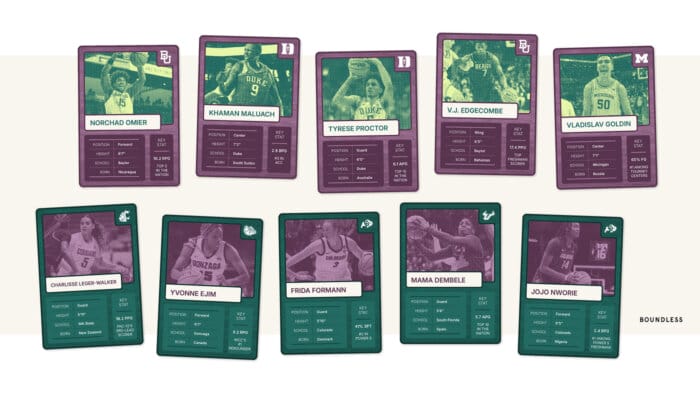
March Madness isn’t just about basketball. This year’s tournament includes 134 players from 52 countries —14% of all athletes. For HR leaders, it’s a case study in how to recruit and support global talent at scale.
College basketball teams aren’t just looking overseas for the best players. They’ve built systems to identify, integrate, and develop talent from around the world. The most successful programs don’t stop at recruitment — they create an environment where international players thrive.
Here’s what HR teams can learn from the NCAA’s international playbook.
1. Build talent systems, not one-off campaigns
The best basketball programs don’t treat international recruiting as a side project. They build long-term pipelines:
- Specialize by region: Gonzaga has strong ties in Europe. Saint Mary’s is known for finding talent in Australia. Companies should do the same — develop local expertise instead of lumping all “international hiring” together.
- Invest in the right channels: Programs hire scouts with cultural and language knowledge. Businesses can hire recruiters with deep experience in key regions.
- Use technology wisely: AI tools, digital interviews, and virtual assessments help level the playing field. Look for tools that make global hiring easier, not more complex.
2. Support international talent beyond Day One
It’s not enough to hire global talent — you need to help them succeed:
- Plan for cultural integration: Teams offer language help, cultural support, and mental health resources. Employers can do the same through robust onboarding and employee support.
- Hire specialists: Just like teams have staff for immigration and logistics, companies need HR pros who understand visas, relocation, and international benefits.
- Think about families: College programs support players’ families, knowing it improves performance and retention. Companies can offer spousal support, school guidance, and help finding community.
3. Build a culture that adapts and grows
Top teams don’t just accommodate different cultures — they evolve with them:
- Train for cultural intelligence: Give managers and teams tools to work across cultures — not just employees coming from abroad.
- Balance consistency with flexibility: Let people bring different communication and work styles. The goal isn’t assimilation but collaboration.
- Celebrate different strengths: Great teams don’t ask players to conform to one way of doing things. They succeed by making space for different approaches.
4. Make immigration part of your strategy
Immigration isn’t just a compliance box, it’s a talent advantage:
- Plan ahead: Strong teams start visa processes early. HR teams should do the same — build immigration into recruiting timelines, not after the fact.
- Streamline the process: Use digital tools to manage documents and timelines so talent doesn’t get lost in the shuffle.
- Prepare for emergencies: Have a plan for delays, denials, or global disruptions. The more prepared you are, the better your employees will feel.
5. Stay ahead of global mobility challenges
Even well-run programs hit challenges. Get ready for them:
- Know the tax and pay rules: College teams deal with cross-border issues around NIL (name, image, likeness) money. Businesses need to understand international payroll, taxes, and equity.
- Watch the geopolitical landscape: Politics can affect where you can recruit. Build flexibility into your hiring strategy.
- Support returns home: Teams help players transition back after graduation. Companies should do the same — help global employees prepare for repatriation.
6. Treat global talent as a business priority
Programs with strong international roots often perform better than those that recruit only locally. Companies that prioritize global talent — across recruitment, development, and retention — will have a clear edge.
Get started: Build your global talent playbook
Want to put these ideas into practice? Try this phased approach:
- Assess your current international hiring practices
- Align with business needs and target key regions
- Build infrastructure for onboarding and long-term support
- Train teams on cultural intelligence
- Refine through feedback and ongoing updates
You don’t need a huge budget to compete for global talent — you need the right strategy. Just like March Madness, the best teams win by doing the fundamentals right.
For more info, Boundless has put together an in-depth data report on how the NCAA’s international recruiting strategies can teach companies to build high-performing global teams.